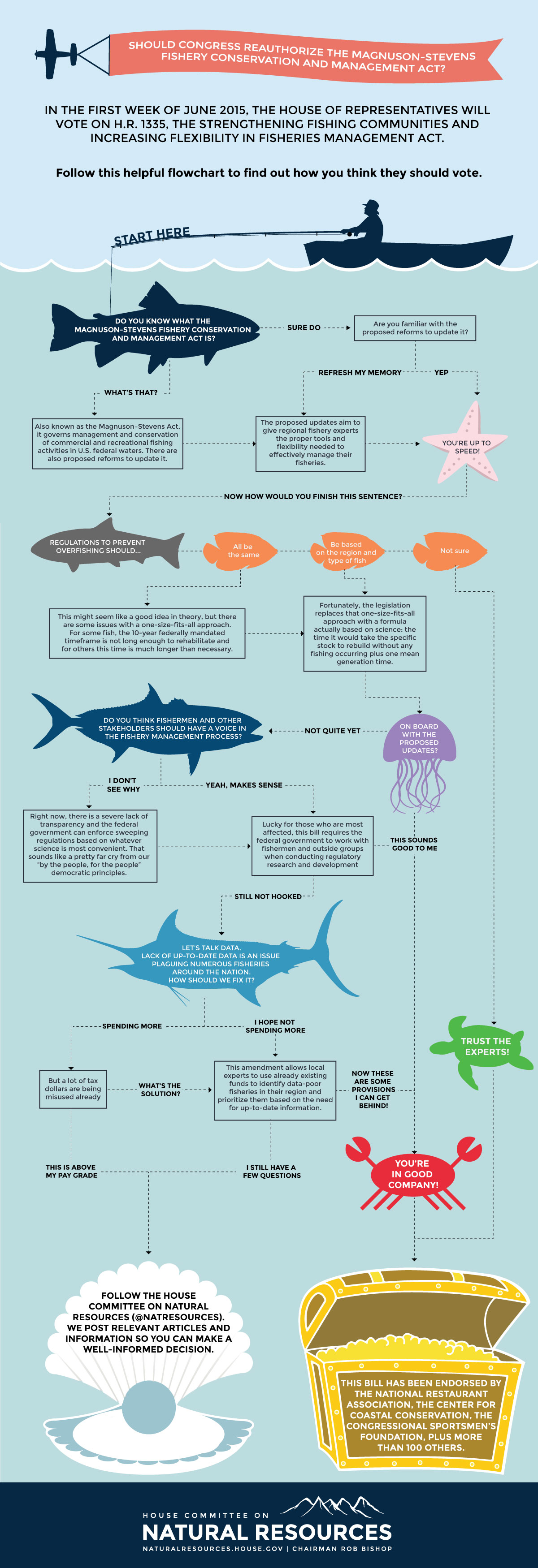
From our Hill Sources: The Senate was in session on Sunday—a rare occurrence—to consider reforming NSA surveillance programs before provisions of the PATRIOT Act expire at midnight. The House will return on Monday to consider American fishing, modernizing the Toxic Substance Control Act and several land bills. Also, it’s Appropriations season!
Reforming NSA Surveillance
The Senate returned to session on Sunday, May 31, to consider whether to reform NSA data collection before the midnight deadline that will "sunset" major provisions of the PATRIOT Act. They failed to reach a deal before they left for the Memorial Day recess—and the debate continues on the Senate floor today. On Sunday, the Senate voted 77-to-17 to advance the House-passed USA Freedom Act, reforming NSA surveillance programs. Sixty votes were needed for the bill to move to a vote.
In the House, critics of the PATRIOT Act have kept guard over the Memorial Day recess to ensure that the expiring provisions weren’t extended without their consent while members were out. There was some speculation that House Speaker John Boehner (R-OH) could bring a short-term extension up for a voice vote during a brief pro forma session and enact it as long as there were no objections.
The House passed a bill reforming the NSA data collection program before leaving for recess, which the Senate is now considering:
USA Freedom Act ( HR 2048)
Sponsor: Rep. James Sensenbrenner (R-WI) To reform intelligence-gathering programs operated under the Foreign Intelligence Surveillance Act (FISA). According to House Judiciary Committee Chairman Bob Goodlatte (R-VA), the bill:
- Ends bulk collection (“In place of the current bulk telephone metadata program, the USA Freedom Act creates a narrower, targeted program that allows the Intelligence Community to collect non-content call detail records held by the telephone companies, but only with the prior approval of the FISA Court. The records provided to the government in response to queries will be limited to two “hops” and the government’s handling of any records it acquires would be governed by minimization procedures approved by the FISA Court.”);
- Prevents government overreach (“strengthens the definition of “specific selection term,” – the mechanism used to prohibit bulk collection – to ensure the government can collect the information it needs to further a national security investigation while also prohibiting large-scale, indiscriminate collection, such as data from an entire state, city, or even zip code.”);
- Strengthens protections for civil liberties (“creates a panel of experts to advise the FISA Court on matters of privacy and civil liberties, communications technology, and other technical or legal matters.”). (Source: House Judiciary Committee) (Read bill text)
American Fisheries
In a memo to House Republicans, Majority Leader Kevin McCarthy (R-CA) prioritized the American fishing industry on this month’s agenda: “The American fishing industry doesn’t just put food on the plates of millions of American families; it also supports jobs and the economy.” This week, the House will vote on:

Strengthening Fishing Communities and Increasing Flexibility in Fisheries Management Act (HR 1335)
Sponsor: Rep. Don Young (R-AK) “This reauthorization of the Magnuson-Stevens Act will increase local control so that councils and local stakeholders have greater ability to manage their fisheries. It will also promote the conservation and management of U.S. fishery resources, ensure sustainable domestic fisheries can be harvested in federal waters, and provide for a thriving domestic seafood industry,” according to the House Majority Leader Kevin McCarthy. (Read bill text) Flow chart from the House Committee on Natural Resources.
From our Hill Sources: The Magnuson-Stevens Fishery Conservation and Management Act (Magnuson-Stevens Act) is the primary law governing marine fisheries management in US federal waters. First passed in 1976, the Magnuson-Stevens Act fosters long-term biological and economic sustainability of our nation's marine fisheries out to 200 nautical miles from shore. The goals of the law include preventing overfishing, rebuilding overfished stocks, increasing long-term economic and social benefits, and ensuring ensuring a safe and sustainable supply of seafood. (Learn more.)
This week, the House will also vote on a related bill:
National Estuary Program Reauthorization (HR 944)
Sponsor: Rep. Frank LoBiondo (R-NJ) —Bipartisan— To reauthorize the National Estuary Program. “Established in 1987, the NEP’s goal is to improve the quality of estuaries by developing plans for attaining or maintaining water quality. This includes protection of public water supplies and the protection of indigenous populations of shellfish, fish, and wildlife. According to the National Oceanographic and Atmospheric Administration (NOAA), the nation’s estuaries provide habitat for 75% of the US commercial fish catch and 80-90% of the recreational fish catch,” according to the bill sponsors. (Read bill text)
Modernizing the Toxic Substances Control Act
Toxic Substances Control Act Modernization Act (HR 2576)
Sponsor: Rep. John Shimkus (R-IL) —Bipartisan— “The landmark bill is a bipartisan effort to bring reform to the decades-old Toxic Substances Control Act. The legislation will improve the protection of human health and the environment, help better facilitate interstate and international commerce, and provide the public greater confidence in the safety of American-made chemicals and the products that contain them,” according to the House Energy & Commerce Committee.
According to the Committee, the TSCA Modernization Act would:
- Provide EPA the tools to ensure chemicals in commerce are safer for consumers
- Create a new system for EPA to evaluate and manage risks associated with chemicals already on the market
- Set deadlines for EPA to take action (Risk evaluations must be completed within 3 years; Risk management rules must follow completion of risk evaluations by 90 days)
- Ensure user fees paid to EPA for specific purposes are used just for those purposes
- Provide limited preemption of state law
- Maintain protection of confidential business information
(Read bill text)
Appropriations
It’s Appropriations Season in Congress! The Congressional budget resolution allocates the maximum amount of funding for all discretionary federal initiatives in every fiscal year. It’s the appropriators who determine how much actual funding is dedicated for each discretionary initiative, which constitutes about one-third of the federal budget. There are 12 appropriations bills organized by agencies and focus. This week, the House will consider:
Commerce, Justice, Science, and Related Agencies Appropriations Act, 2016 (HR 2578)
Sponsor: Rep. John Culberson (R-TX) “The bill funds the Department of Commerce, the Department of Justice, the National Aeronautics and Space Administration (NASA), the National Science Foundation (NSF), and other related agencies. The legislation contains $51.4 billion in total discretionary funding, an increase of $1.3 billion over fiscal year 2015 and $661 million below the President’s request for these programs. The bill prioritizes funding for law enforcement, national security, science, and space exploration programs,” according to the House Appropriations Committee. (Read bill text or summary)
This week, the House may also consider:
Transportation, Housing and Urban Development, and Related Agencies Appropriations Act, 2016 (HR 2577)
Sponsor: Rep. Mario Diaz-Balart (R-FL) “In total, the bill reflects an allocation of $55.3 billion in discretionary spending – an increase of $1.5 billion above fiscal year 2015 and $9.7 billion below the President’s budget request. However, given reduced offsets – primarily caused by a $1.1 billion decline in Federal Housing Administration receipts – the bill actually represents an increase of only $25 million above the current level. Within the legislation, funds are targeted toward transportation, infrastructure, and housing programs of national need and significance that have the biggest impact on Americans and communities across the country,” according to the House Appropriations Committee. (Read bill text)
Also in the House…
The House plans to vote on the following bills this week:
Authorizing early repayment of obligations to the Bureau of Reclamation within the Nebraska Northport Irrigation District (HR 404)
Sponsor: Rep. Adrian Smith (R-NE) Authorizes any landowner within the Northport Irrigation District in Nebraska to repay, at any time, the construction costs of project facilities allocated to the landowner's land within the District. Provides that upon discharge in full of the obligation for repayment of all such costs, the parcels of land shall not be subject to the ownership and full-cost pricing limitations under federal reclamation law. Directs the Secretary of the Interior, upon request, to provide to the landowner who has repaid such costs in full a certificate acknowledging that the landholding is free of such limitations. (Read bill text)
Revoking the charter of incorporation of the Miami Tribe of Oklahoma (HR 533)
Sponsor: Rep. Markwayne Mullin (R-OK) —Bipartisan— Accepts the request of the Miami Tribe of Oklahoma to revoke the charter of incorporation issued to that tribe and ratified by its members on June 1, 1940. (Read bill text)
Native American Children's Safety Act (HR 1168)
Sponsor: Rep. Kevin Cramer (R-ND) “A background check must be conducted on all adults living in a potential foster home before a tribal court can place any child there. This must include a National Instant Criminal Background Check as well as a search of child abuse or neglect registries maintained by the tribe or any state the individual has lived in the preceding five years. Any adult 18 years or older who moves into the home after placement of the child would also be required to undergo the same thorough check. A tribal foster care placement would be prohibited if a search reveals that a covered individual has been convicted of felony spousal or child abuse, felony child neglect, felony drug conviction, or a violent felony,” according to the bill sponsors. (Read bill text)
Designating a “Sky Point” Mountain (HR 979)
Sponsor: Rep. Tom McClintock (R-CA) —Bipartisan— To designate a mountain in the John Muir Wilderness of the Sierra National Forest as "Sky Point" (Read bill text)
To convey federal property in Alaska to the Municipality of Anchorage (HR 336)
Sponsor: Rep. Don Young (R-AK) Directs the Administrator of the General Services Administration, on behalf of the Archivist of the United States, to convey to the City of Anchorage, Alaska, property in such city consisting of approximately nine acres and improvements located at 400 East Fortieth Avenue for not less than fair market value. (Read bill text)
Girls Count Act (S 802)
Sponsor: Sen. Marco Rubio (R-FL) —Bipartisan— “Directing current US foreign assistance programming to provide assistance to support the rights of women and girls in developing countries by working to establish birth registries in their countries,” according to the bill sponsors. “Every year, approximately 51 million children under the age of five are not registered at birth, most of whom are girls. Proof of birth determines a child’s citizenship, nationality, place of birth, parentage and age, which are critical to ensuring children remain a part of society and do not fall victim to dangers such as exploitation.” (Read bill text) – Passed by the Senate; now goes to the House for consideration –
Protect and Preserve International Cultural Property Act (HR 1493)
Sponsor: Rep. Eliot Engel (D-NY) —Bipartisan— “Would impose import restrictions on cultural property illegally removed from Syria, mirroring restrictions currently in place for Iraq, and better coordinate US government efforts to protect cultural property around the world. It would designate a Coordinator for International Cultural Property Protection at the Department of State and establish a Coordinating Committee to organize inter-agency efforts to combat the destruction of cultural property due to political instability, armed conflict, or natural disaster,” according to the House Foreign Affairs Committee. “Cultural property has recently been lost in Syria and Iraq at the hands of ISIL and other groups, in Egypt due to political instability, in Mali and Afghanistan from radical Islamist activity, in Haiti from the 2010 earthquake, and as a result of the 2004 Indian Ocean tsunami.” (Read bill text)
— Please keep in mind that highlighting a bill doesn't imply a POPVOX endorsement in any way. Rather, we're simply trying to offer one more way to stay informed of a complex legislative system. —